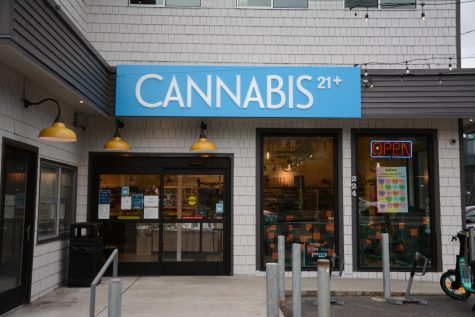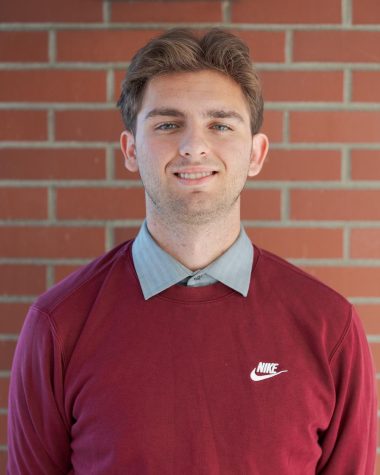Marijuana on our Christian campus
Exploring ethical, legal implications of SPU marijuana policies
February 24, 2022

When it comes to cannabis, Seattle Pacific University sets itself apart from the other two major universities within the Emerald City limits.
According to Article 10.4 of SPU’s student handbook, “Students who possess, distribute, and/or use narcotics on or off campus (including medical marijuana, misuse of prescription drugs, Salvia, any form of hallucinogens, paraphernalia, etc.) or other intoxicants on or off campus will be subject to the disciplinary process.”
The University of Washington and Seattle University only explicitly ban the green product for on-campus activities, largely due to their federal funding. This the reason most colleges and universities in the country ban the product for campus sponsored events.
According to Jeff Jordan, vice provost for student formation and community engagement, SPU’s stricter version of the policy exists to encourage the health and wellness of SPU students, and is largely influenced by the University’s Free Methodist tradition.
“From what we understand, from the research, there’s a lot of struggles about the positive aspects of marijuana use,” Jordan explained. “As far as just general usage or recreational usage, there’s not been much that we’ve seen as a positive reason behind all that, now that’s debated, but for our campus community, that’s our reasoning on that.”
SPU has maintained an affiliation with the Free Methodist Church since 1891 and since then the church has had heavy influence on the school’s policies and lifestyle expectations.
According to the Free Methodist Church’s book of resolutions, “We urge all persons to abstain from all use of marijuana, unless it has been legally prescribed in a form appropriate for treating a particular medical condition.”
SPU theology professor Dave Nienhuis explained that these policies are steeped deep in the Free Methodist tradition of temperance.
“For SPU, the story is rooted in our Free Methodist heritage, which found much of its orienting vision in the proclamation and practice of freedom,” Nienhuis said. “Freedom from slavery, freedom for women in leadership, freedom from poverty, free/egalitarian association in local congregations, and, to the point of your question, freedom from that which is addictive, especially because such things have particularly negative effects on those who are poor.”
About a decade ago, SPU changed their student handbook to allow students over the age of 21 to drink alcohol off campus. At the time of the policy change, marijuana was still illegal in the state of Washington, which is no longer the case.
Philosophy professor Patrick McDonald believes this is ethically inconsistent, and he does not think SPU should manage the lives of students who are over the age of 21.
“We may decide to find a middle ground where we go beyond what’s strictly legal in the ethical character we try to promote,” McDonald explained. “But then I think it would have to be a pretty clear and overriding part of our Christian mission to do that and I don’t see how regulating the use of marijuana in a responsible manner off campus for students over the age of 21 is something required by our Christian mission or by other ethical considerations.”
McDonald is also concerned that strict policies like SPU’s ban on marijuana can have unequal impacts on different students from different demographic groups.
“What if they fine you and you can’t pay the $300? Then what? I think they put a hold on your registration,” McDonald said. “So who’s that going to affect the most? People who can’t pay the fine. If Mom and Dad can’t pay the fine or there is no mom or dad, they take the brunt.”
Jordan stated that the university has worked with students on paying the fine.
“We do work with students related to the fine. They can appeal and usually we can work with students on how to pay or other options. Usually, these are one-to-one situations,” Jordan said.
In a poll of 101 SPU undergraduate students, 83% said they do not believe SPU should have a ban on marijuana for students over the age of 21 who partake off campus.
Junior interior design major Jazmin Aquilar disagrees with SPU’s off-campus marijuana policy.
“When you are an adult, it shouldn’t matter what I or any other adult does off-campus, what happens off-campus is none of SPU’s business,” Aquilar said.
Chris Girard, a cannabis lawyer for the Cultiva Lawfirm, handles cannabis law in the state of Washington. He says that SPU’s off-campus marijuana ban is not a legal issue and that it is merely a private agreement between students and the university.
“You’re just part of a club at that point,” Girard said. “You have to agree to the club or they won’t let you go there.”
Girard explained that when universities use federal funding as reasoning for harsh marijuana policies, they are stretching the actual language of the law, and that students carry more personal risk than schools if they are caught possessing cannabis on federal property.
“As far as on campus, they would have to prove the school is complicit, that they knew it was happening under their nose and taking kickbacks,” Girard explained. “If somebody got arrested, if you accept any federal funds, student loans, Pell Grants or anything like that and you get a drug charge, then you can no longer get federal funding for school.”
Girard believes marijuana policies that prohibit of-age students from possessing or using the substance off campus are outdated policies, and he hopes that students will dispute more of them in the future.
“Somebody needs to challenge that,” Girard said. “It’s something that if challenged, I imagine would be accepted. There’s not too many people against people doing things in their own time.”

























































































